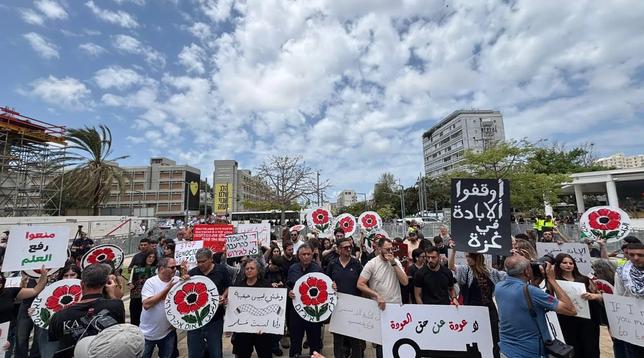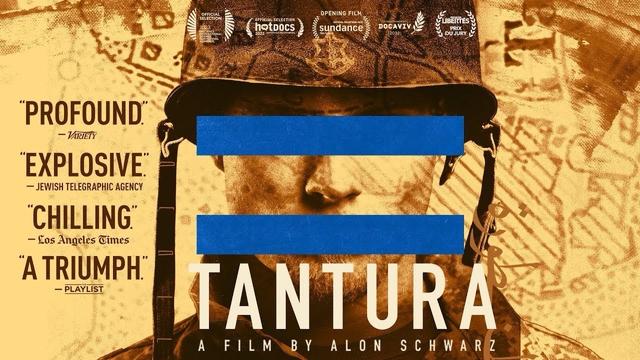[…] If we are thirsty, we will squeeze the rock, and if we are hungry, we will eat the earth. We will not leave. Here we have a past, present, and future.
Zionist historians, such as Benny Morris, dismiss personal accounts of survivors and eyewitnesses, except for those who were #Holocaust survivors. In fact, Israel’s ethos is built on these accounts, albeit retrospectively. These accounts have been exploited to justify the genocide of the Palestinian people.
The #Tantura massacre, an event of the Nakba that Israelis are still unable to acknowledge, has been a subject of controversy in recent years. Documentaries exposing the horror of the massacre continue to be produced today. Here’s a story of a second-generation #Nakba survivor from her speech at the ceremony commemorating the ongoing Nakba on May 14th, Antin Square, Tel Aviv University (which stands on the lands of Sheikh Munis).
—————-
Ayoub, Muhsen, Dasouki, and Kanaanah. These are the names of my families, from different places in historical Palestine. In a parallel world, where the Nakba had not occurred, I would have grown up in Ajzam, my father's family's village, and I would spend every weekend at my grandfather's house, facing the coast in Tantura. I was supposed to be a daughter of the Carmel, and even though I am now a daughter of the Carmel and the coastal plain, it is much more complicated... I remember the age when I began to see the difference between my grandfathers. One would go to Ajzam, today Kerem Maharal. The other would walk down to the beach of Tantura every morning, and I would accompany both of them on their walks.
I don't know how to tell you this story. The most appropriate thing is to tell it to you as it is. My grandfather, Youssef, is a survivor of the Tantura massacre. He was six years old at the time of the massacre, when he saw his loved ones killed, and was forced to bury some of his family with his own hands. His entire family is buried under the ruins of the village. Today, this area has a parking lot for visitors to the beach, which has been given the name "Dor Beach."
My grandfather was not one of those who talked about and shared the story of their displacement. He was one of those who lived the tragedy in silence and pain. Until a certain age, I was unable to understand his insistence on visiting the beach every day. Until one day he said that he had one wish in life – to die on the beach of Tantura. My grandfather did not continue with his wish, and did not say that he wanted to be buried on the beach of Tantura, because he knew that a thick layer of asphalt separated him from his wish.
My grandfather on the other side, Hassan, was a farmer who loved his land. He taught us to love the land like him and to enjoy picking za'atar, hubeza, and everything that the good land gives us. He used to describe Ajzam as a paradise, where pure springs flow. Although he was displaced and lived in several places since that cursed day, in Ein Hod or in my current residence of Furaydis, the name Ajzam always remained on his lips. He would glorify it to such an extent that if one of his grandchildren showed intelligence or talent, my grandfather would say to him with great pride: "You are truly a Jazmawi."
Despite the different stories, both of my grandfathers felt the pain of losing land and saw their loved ones die before their eyes. Israel not only stole the land and the lives of those who lived on it, it also stole their dreams and wishes, it stole their lives. I want to go back and complete the story of my grandfather Youssef – the Tanturi. The story of my grandfather's life ended two years ago, but it accompanies me to this day. His wish that I told you about came true. On a day like any other, two years ago, my grandfather went for a walk on the beach of Tantura – and fate decided to fulfill his last wish. My grandfather died of a heart attack on the beach of Tantura, after he finished walking, breathed the air of Tantura, and was satisfied with the beauty of its landscapes.
My grandfather Youssef's story is indeed a sad story, but I, as his granddaughter, would not wish him any other fate. He was born in Tantura and returned to it. How can I wish something else for someone who was always singing about Tantura: "You filled my heart with your love. Wrap yourself in my eyelashes and sleep in peace. And like your land, I have not loved and to my blood it is equal." Both of my grandfathers continued to Furaydis, which was a safe haven for them. But my story does not end there.
Israel, in its criminal ways, has tried and is still trying to erase everything Palestinian. The war of extermination against our people in Gaza is still ongoing. Since its beginning, many stories have been added to the stories of the Nakba – more than 70,000 stories. From this platform, I want to promise my grandfather and our heroic people clinging to their homeland in Gaza that we will preserve your stories and tell them to preserve the memory. They will be the answer to any attempt to separate us from our people and from their right to return and liberation.
And because we are a proud, stubborn, and living people, I found in the stories of our family displacement the story of Palestine. My grandfather Youssef fulfilled his wish and died on the beach of Tantura as he wished. I found the spring of Ajzam and drank from its waters, and I met my neighbor from #Ajzam on the path of struggle. But the road is still long. The Palestinian students, and all our people who remained in their homeland, promise that we will continue on this path until the end – until liberation, return, and the Palestinian state. We are here to stay, and if you do not agree – drink the sea water. We will preserve the shade of the fig and olive tree and sow thoughts, like yeast in dough, with coolness and a burning heart. If we are thirsty, we will squeeze the rock, and if we are hungry, we will eat the earth. We will not leave. Here we have a past, present, and future.
Translated from Hebrew https://zoha.org.il/137557/
Tantura (2022) trailer
https://www.youtube.com/watch?v=HNtrUjUNkJw

